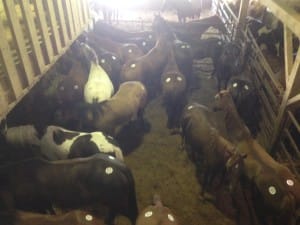American Veterinary Medical Association’s Pro Slaughter Position
It reads: “Consumption of horsemeat by humans is a cultural and personal choice; the veterinarian’s primary focus is on the health and welfare of the horse throughout its life. That said, our veterinary associations believe the humane slaughter of horses is preferable to a life in discomfort and pain, inadequate care, or abandonment.”
The position concludes: “Horses destined for slaughter should be handled and transported to the processing facility in a humane manner. Use of local slaughter facilities is preferred to avoid welfare risks (e.g., physical and mental stress, injury) associated with long-distance travel. Horses should be humanely slaughtered consistent with the requirements of the country in which the horses are being processed.”
The above statement is a surprise, when you figure that it comes from an organization that comprises veterinarians, but it is no surprise when you know the history of the organization’s position on horse slaughter.
As far as I can tell, there are three fundamental flaws to the position:
1. it presents the end of life choice for horses as binary, it is not. Many choose humane euthanasia, performed by a vet.
2. it uses the phrase “humane slaughter”, many argue that the slaughter process is not humane, and incentives in the slaughter pipeline do not favor humane treatment.
3. horses are not born a food animal. This becomes a food safety concern, given the concoction of drugs they might ingest, undocumented, over a lifetime. The AVMA knows this better than any other organization, their members prescribe and administer those drugs.
Habitat for Horses had a few choice words in response: International joint statements address horse slaughter, rabies in dogs.


Glad we could help and glad to see they made the trip to Tucson safely. We reecltny had a mare get badly injured at the kill lot trying to get back to her foal and they shipped her anyway .keeping these mares and foals together is so important. And we were lucky the guy who runs the kill lot had already separated these two and started to pull away but came back and unloaded for us if it weren’t for our volunteers being dedicated we might have lost these two. I’m so glad Judy was able to take them on when we’re seeing 2-3 double deckers a week pull out fully loaded to mexican slaughter in our neighborhood.
First of all, let me be clear — I am against horse slaughter. I believe there are more humane ways to deal with the issues of starving, sick, injured, and abandoned horses.
The AVMA bases its position on what they see as a burgeoning problem — a dramatic increase in horses left to starve, turned loose (abandoned) in the West, injured or sick and not receiving veterinary care. Because this is occurring on such a large scale, the AVMA believes it to be more humane to slaughter those horses rather than have them suffer. That’s all well and fine; however, sentiments aside, we all know that humane horse slaughter simply does not exist, nor does humane treatment of slaughter-bound horses at auctions, feedlots, and transport.
We can all argue for euthanasia, but the sad reality is many people who abandon horses don’t have the $75 to euthanize the horse and then pay a renderer to dispose of the body.
As we know, prohibiting horse slaughter in the U.S. didn’t solve the problem. In fact, it made it worse as it added the inhumane transport of horses.
What I believe we need to do now is to actively advocate, at the state level, to ban the sale of horses for slaughter. This certainly wouldn’t stop private sellers, but it could stop thousands of horses from being sold to kill buyers through auctions. If we can get a few states on board, it would add credibility to our argument to ban the sale of horses for slaughter across the U.S.
This is a problem that won’t ever go away completely. There are unscrupulous people who will always find a way to buy horses from private parties; however, if we can eventually get this ban passed at the Federal level, then kill buyers would not be allowed to transport horses for slaughter across borders.
This needs to be a dual advocacy effort, however, as we would need to have measures in place to address the problem of horses left to starve or callously abandoned. We need to poke holes in each of the AVMA’s statement. Having ready, practical plans to address those issues is key to achieving an end to the sale of horses for slaughter in the U.S.
Cheryl Hague,
Governors State University
chague@govst.edu
While the AVMA has been proactive in some other welfare-related horse issues, the organization makes its position policies on an issue-by-issue basis. The slaughter of animals for meat is a primary industry in the United States, employing thousands of veterinarians in inspection and herd management roles.